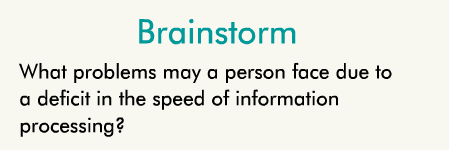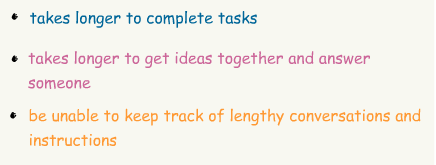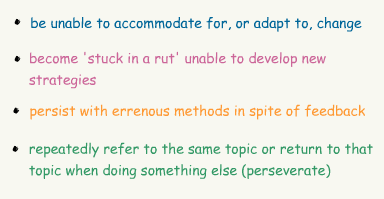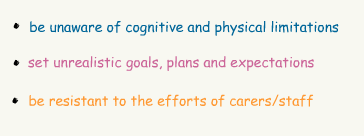- SELF STUDY MODULES
- 1. Intro to TBI
- 2. Communication
- 3. Skills for independence
- 4. Cognitive changes
- 5. Behaviour changes
- 6. Sexuality
- 7. Case management (BIR)
- 8. No longer available
- 9. Mobility & motor control
- 10. Mental health & TBI:
an introduction - 11. Mental health problems
and TBI: diagnosis
& management - 12. Working with Families
after Traumatic Injury:
An Introduction - 13. Goal setting
4.3 Common cognitive changes
Identify some of the common cognitive changes resulting from TBI
i) Consequences of traumatic brain injury
The consequences of a traumatic brain injury are diverse. After acute recovery and intensive rehabilitation, the individual, their family and friends have to adjust to the changed situation and face the long-term future.
When someone suffers traumatic brain injury, a number of problems may arise as a result of physical damage to the brain. The problems will vary from individual to individual, and will depend on a number of factors. These include:
- the person’s pre-injury cognitive strengths and weaknesses
- the person’s pre-injury personality and coping style
- the extent, location and nature of damage to the brain
- the extent of spontaneous recovery which takes place
TBI’s from motor vehicle accidents often causes a generalised pattern of cognitive impairments. This type of injury often involves twisting, stretching, bleeding and bruising of the brain as opposed to a localised or penetrating type of injury like a stab wound where the resulting impairments are usually more specific to the location of damage.
However each individual is likely to display a different pattern of impairments and few people exhibit all possible consequences. One type of deficit may be severe, another mild, and another absent. A person may, for example, have a poor memory, minor problem-solving difficulties but no change in their personality.
Apart from the brain injury itself, there are other factors that will affect the person’s behaviour. The circumstances they find themselves in are quite different to their pre-injury lives. Some of the changes include:
- spending large amounts of time in hospital and attending appointments
- loss of social contacts and often friends
- loss of income and the financial uncertainty of the future
- physical impairments
- loss of independence and the need to rely on others for previously simple, day-to-day activities.
ii) Cognitive changes
Examples of effects of some common cognitive changes are:
1. Information processing
- slowed processing
- poor mental tracking
- fatigue
2. Attention
- short attention span
- poor concentration
- poor attention to detail
- easily distracted
3. Memory
- difficulty learning and remembering new information
4. Problem solving
- difficulty working out how to do things
5. Flexibility
- unable to shift to or think of a new solution/method
- may perseverate (repeatedly refer to the same topic or keep returning to that topic)
6. Planning and organising
- poor preparation, eg. starting something without considering options
- difficulty understanding or recognising the steps involved
7. Reasoning
- thinking is often rigid and concrete
- tendency to take things literally
8. Self monitoring
- poor use of feedback and breaking rules
- not picking up on cues
9. Insight
- unaware of own limitations
- unrealistic goals or expectations
The information provided here is a guide and doesn’t reflect hard and fast divisions. For example, a person having difficulty learning new information may have a poor memory and/or attention deficits or poor organisational skills.
Each individual is likely to show a different pattern of cognitive changes, often combined with some preserved abilities.


 Check your answers here
Check your answers here



